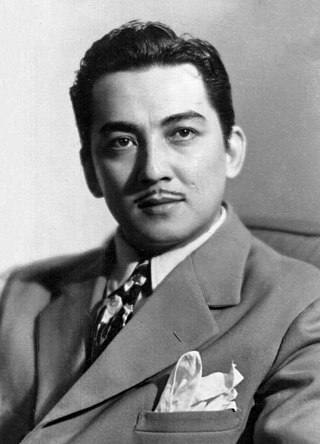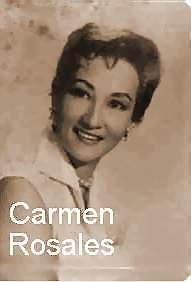
ABS-CBN Film Productions, Inc., doing business as Star Cinema and also known as ABS-CBN Films, is a Philippine film, television production and distribution company headquartered in Quezon City. It is one of the largest film studios in the Philippines, along with Regal Entertainment, GMA Pictures and Viva Films. Star Cinema has produced and released most of the highest-grossing Philippine films of all time.

LVN Pictures, Inc. was a Filipino film studio that was considered one of the biggest in the history of Philippine cinema and its foremost establishment in motion picture post-production until 2005. In its heyday of motion picture production, LVN Pictures has been compared to that of the Metro-Goldwyn-Mayer Studios (MGM) of Hollywood because it had, under contract, the biggest stars and film craftsmen of the period. Before its closure in 2005, LVN Pictures was known as one of the oldest living film studios in the country.

Sampaguita Pictures was a Philippine film production company. It was named for the Philippine national flower, sampaguita. Though no longer functioning, the company's Sampaguita Compound remains in Quezon City.

Regidor Lim de la Rosa, professionally known as Rogelio de la Rosa, was a Filipino actor and politician. He was one of the most popular Filipino matinee idols of the 20th century. He is also remembered for his statesmanship, and in particular, for his accomplishments as a diplomat. Elected to the Philippine Senate from 1957 to 1963, he was the first Filipino film actor to parlay his fame into a substantial political career, paving the way for other future Filipino entertainers-turned-politicians such as Senators Ramon Revilla Sr., Tito Sotto, Ramon "Bong" Revilla Jr., Jinggoy Estrada, Lito Lapid, Freddie Webb, Robin Padilla, and President Joseph Estrada.
Eustacio Ylagan, better known by his stage name Tito Arévalo, was a Filipino actor and musician.

Januaria Constantino Keller, better known by her stage name Carmen Rosales and by her nickname Mameng, was a noted Filipina actress and World War II guerilla fighter. Her acting career spanned the decades immediately before, during, and after World War II. Her tremendous commercial success and wide fan base before the war led to her being considered the original superstar of Philippine movies. Her stage name, Carmen Rosales, was taken from her hometown of Rosales in the province of Pangasinan.
Monang Carvajal was a Filipina film actress best known for her roles in thriller and horror movies. She was dubbed the "Queen of Horror Pictures."
Guillermo Evangelista de León, simply known as Gil de León, was a Filipino film actor and director.

Rose Stagner, better known by her screen name Rosa del Rosario, was a Filipino-American actress. Regarded as one of the most prominent figures during the Golden Age of Philippine Cinema, she has appeared in 60 photoplays and was the first Filipino actress to appear in multiple Hollywood films Border Bandits (1946) and Anna and the King of Siam (1946). She was the first actress to play the Filipino comic-book superhero Darna on screen in 1951. She was honored with a special Ani Award and was inducted into the Eastwood City Walk of Fame for her significant contributions to Philippine film industry.

Teresita Rigo Durango Magalona, known professionally as Tita Duran, was a Filipino film actress who began as a child actress. She was the first successful child star of Philippine cinema.
Josefino Cenizal was a Filipino actor, director, and composer from Tanza, Cavite. In 1937, he began to direct music films at Parlatone-Hispano Films, which is where his musical career began. In 2010, he received the Dangal ng Filscap Award. His career spanned from the late 1930s to the 1970s. He is famous for adapting "Ang Pasko Ay Sumapit" in 1938 with lyrics provided by Levi Celerio from the original Cebuano Christmas carol entitled "Kasadya Ning Taknaa" composed by Vicente D. Rubi and Mariano Vestil.

José Nepomuceno y Zialcita was one of the pioneering directors and producers of Philippine cinema. He is also known as the "founder of Philippine movies", and he had his own production company Jose Nepomuceno Productions. He produced the first Filipino silent film entitled Dalagang Bukid in 1919. The film starred Atang de la Rama, a future National Artist of the Philippines. He also directed Un (El) Capullo Marchito in 1920. It starred Luisa Acuña, who then became a famous leading lady in Filipino silent films.

Geraldyn "Dina" Schaer Bonnevie-Savellano is a Filipino actress. She is recognized as the industry's "Drama Queen" of her generation. She has won 2 FAMAS Awards, 2 Luna Awards and multiple 'Best Actress' wins and nominations across all leading award-giving bodies in the country.
Domingo Goan Landicho, was a Filipino writer and academician.
Florence Danon-Gayda, better known as Rosa Rosal, is a FAMAS award-winning Filipina film actress dubbed as the "original femme fatale of Philippine cinema." She is also known for her work with the Philippine Red Cross. For her humanitarian activities, she received the 1999 Ramon Magsaysay Award for Public Service, an award widely considered as Asia's Nobel Prize. She is the mother of TV host Toni Rose Gayda.

Gloria Anne Borrego Galla, known professionally as Gloria Romero, is a Filipino actress. With a career spanning 70 years, she has appeared in over 250 motion pictures and television productions. Referred to as the "Queen of Philippine Cinema", she is known for her sophisticated and demure image. She is one of the major stars of the Golden Age of Philippine Cinema in the 1950s to mid 1960s, becoming the country's highest paid movie actress and one of the top box-office draws of the era.
Jhyllianne Wardë is a Filipino actress, model, dancer and singer. She is best known for top-billing several television shows under GMA Network such as Trudis Liit, Prima Donnas and Abot-Kamay na Pangarap.
Rustica Cruz Carpio was a Filipino actress, scholar, playwright, philanthropist, and public servant. Most notably an actress, she performed on stage, film, and television. She received acclaim for her role as Lola Puring in Grandmother, a film by Filipino director Brillante Mendoza which was selected to compete in various international film festivals, including Venice and Dubai. For her acting work in the said film, she was critically well-received, earning nominations and awards, winning the Gawad Urian for Best Actress, the Crystal Simorgh for Best International Actress at the Fajr International Film Festival in Iran, and the Las Palmas International Film Festival Best Actress award in Spain.
Bukas Luluhod ang mga Tala is a 1984 Filipino drama film directed by Emmanuel H. Borlaza from a screenplay written by Jose N. Carreon and Orlando R. Nadres, based on the komiks serial written by Nerissa G. Cabral and serialized on Pilipino Komiks Atlas. Starring Sharon Cuneta, Eddie Rodriguez, Gina Pareño, Pilar Pilapil, Tommy Abuel, Rey "PJ" Abellana, Raymond Lauchengco, Lani Mercado, Eula Valdez, and Janet Elisa Giron, with special participation of Christopher de Leon, the film revolves around a girl who was born into a dirt-poor family and who swore revenge on the rich family that kept wronging them.
Consuelo "Ateng" Padilla Osorio was an early female film director and screenwriter of Tagalog language films in the Philippines.









